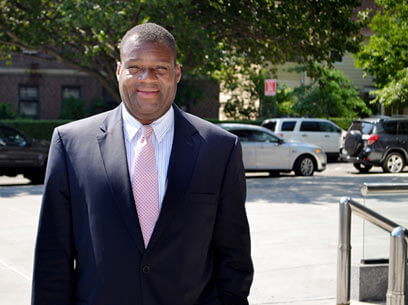By Rich Bockmann
Former southeast Queens City Council candidate Ricardo Brown has racked up an unusually large — and just plain unusual — campaign debt that one expert said could run him afoul of the city’s campaign finance laws.
At the end of the 2013 election cycle, Brown’s campaign account had close to $90,000 in unpaid bills — the most out of all 253 candidates who ran for Council last year — and his filings with the city Campaign Finance Board show the lion’s share of that outstanding debt is owed to his own accounting firm, which billed the broke campaign tens of thousands of dollars in consulting fees.
Several calls placed to Brown requesting comment for this story went unreturned.
After briefly flirting with a run for citywide office, the Rosedale resident ditched his bid for comptroller in 2013 and jumped into his local City Council race, challenging incumbent Councilman Donovan Richards (D-Laurelton). He pulled in just 13 percent of the vote in the three-way Democratic primary and stuck around for the general election, when he earned less than 3 percent of the vote running on the Jobs & Education line.
On voter guides, Brown vaguely identified past positions he held — such as director of a major Long Island non-profit and supervisor at a top accounting firm — though he did not appear to be heavily involved in southeast Queens politics.
Brown participated in the city’s public-matching program, and although the campaign was denied the more than $15,000 in matching claims submitted, it is still required to follow the rules regarding contribution and spending limits.
Even if Brown were paid public funds, campaign finance rules would have precluded him from using them to pay off the $81,784 in consulting fees billed by his accounting firm Brown, Young & Co. CPAs, that showed up on the candidate’s end-of-cycle filings last month.
While it is neither against campaign rules nor totally unheard of for a candidate to make payments using private donations, it certainly raises eyebrows, and the sheer size of the billings — more than half of the campaign’s total spending — is unusual.
Beyond the oddity, the bills may have put Brown between a rock and a hard place.
New York City campaign finance law attorney Laurence Laufer, an expert with the firm Genova Burns Giantomasi Webster who was hired by candidate Bill de Blasio to make sure his mayoral campaign stayed on the straight and narrow, said Brown may incur penalties from the Campaign Finance Board.
“He’s facing two types of consequences at a minimum. One is the skepticism over whether these are actually campaign related liabilities, and the Campaign Finance Board would likely ask for proof that demonstrates these are campaign related.” Laufer said. “And if he can’t show they’re campaign related he could be charged with false reporting.”
“Alternatively then he has to make efforts to have these liabilities repaid,” the attorney said. “Otherwise he runs the risk of being over the limit for in-kind contributions by his accounting firm.”
According to the finance board’s rules, any liability that goes unpaid after more than 90 days is considered an in-kind contribution, and a contribution of that size would trigger a penalty.
And Brown’s outstanding bills are not the only thing odd about his campaign filings.
Let’s start with that accounting firm.
In his filings Brown alternately puts the address for Brown, Young & Co. as his home in Rosedale and 330 Madison Ave., a 39-story office tower in Midtown Manhattan.
But neither the building’s management nor the company that rents out one floor to small businesses has heard of the company.
And there’s still more.
Campaign Finance requires candidates to itemize contributions of $100 or more, and Brown has close to $42,000 — about 70 percent of his entire campaign haul — in unitemized contributions.
On the spending side, where the threshold for detailing expenses is $50, Brown has another $42,0000 in unitemized payments, or about 72 percent of his total spending.
In comparison, the multimillion-dollar mayoral bids of Bill de Blasio, Bill Thompson and Christine Quinn do not show a penny in unitemized contributions.
Alex Camarda, a policy director at the good-government group Citizens Union, said Brown’s book-keeping practices raise a number of red flags.
“I don’t think most voters who give money to candidates get involved in depth in how they spend it. When they give their support there’s some level of trust there,” he said. “The pattern of unitemized contributions, coupled with the payments to his own firm definitely raise questions about the integrity about the spending of the committee.”
Reach reporter Rich Bockmann by e-mail at rbockmann@cnglocal.com or by phone at 718-260-4574.

































